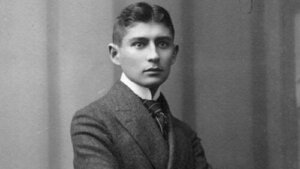Franz Kafka: Philosophy and Thoughts of a Great Writer

Franz Kafka was a Czech writer, whose absurd-themed narrative, reflecting the anguish of the human being in the face of the meaninglessness of his existence, places him as a precursor of philosophical existentialism. Let’s see who this great writer was and the philosophy behind his writings.
Franz Kafka: his life and work
Franz Kafka was born on July 3, 1883, in Prague, which at that time was part of the Austro-Hungarian Empire. He was born into a Jewish family related to the petty bourgeoisie.
From an early age, Kafka was interested in writing. However, he studied law at university under the influence of his father, with whom he had a strained relationship throughout his life. Especially because of his overbearing upbringing and difficult temperament.
He was a lawyer and practiced his profession at the Industrial Accident Insurance Institute for the Kingdom of Bohemia. However, what really gave meaning to his life were the arts.
Around 1907, Franz Kafka began to write his first stories, while working as a consultant in an insurance company. In 1912 he became aware that he could be a successful writer, so that same year he wrote The Trial and Contemplation (a collection of 18 stories that had previously appeared in various media).
This last text made him famous as a writer.
From then on, he dedicated himself to writing other works, such as Consideración (1913), La metamorfosis (1915), En la colonia penitenciaria (1919), El proceso (1923), among others. He also wrote several narrative pieces in the genre of aphoristic parables.
In 1917 he was diagnosed with tuberculosis, which forced him to maintain frequent periods of convalescence and isolation in different sanatoriums, until his death in June 1924.
It should be noted that Kafka only published a few short stories throughout his life, and much of his work went virtually unnoticed until after his death. Shortly before his death, he told his friend and executor, Max Brod, to destroy all his manuscripts. He ignored him, however, and oversaw the publication of most of the writings.

Read more: Spinoza’s Philosophy and His View of Nature
Characteristics of his work
Franz Kafka’s literature has the particularity of being complex and full of symbolism. In his works, the most interesting aspects are the reflections that emerge from them, rather than their narrative essence.
The protagonists are not heroes
In Kafka’s stories, the protagonist wants to escape from his reality at all costs, but is unable to carry out any action that would allow him to overcome it. In other words, they’re helpless characters without a political vocation to transform the world they live in, no matter how suffocating it may be.
In works such as The Trial or The Metamorphosis, the protagonists don’t fight against the external environment they repudiate. On the contrary, we see people whose actions are controlled by the social system itself.
For example, Gregorio Samsa, the protagonist of The Metamorphosis, seems more concerned with how his family is going to get ahead economically than with recovering from his new condition. Thus, the need to return to work becomes more necessary than his change.
He only decides to give up and end his struggle when he realizes that his family can now support itself, thus achieving the only possible liberation from work and illness: death.
On the other hand, all the decisions of Mr. K (protagonist of The Trial), don’t arise from his own freedom or decision, but are due to the organization of the same society that forces him to go to the lawyer’s house, to the attics of the administration, etc.
Thematic of the absurd
The term Kafkaesque has been used to describe everything that, despite its apparent normality, is absurd. Kafka raises the terrifying possibility that the system we live in, and which we assume is normal, is really an absurdity.
In Kafka’s works, reality is fractured and human beings have to try to amend their existence by acting normally. Therefore, faced with the feeling of being out of place, the protagonist has no choice but to get up in the morning to go to the office (even if he has become a giant bug); or to be subjected to a series of bureaucratic processes without knowing exactly why, but because the law demands it.
Fragmentary work
Franz Kafka’s work is also characterized by being fragmentary. This means that there is no origin or beginning in it. In fact, what defines it is the impossibility of finding foundations.
For example, in The Trial we see how Mr. K wakes up one morning with some officials in his room informing him that he is under arrest. From then on, his life begins to develop within the framework of a bureaucratic process, without even knowing what he is accused of.
Throughout the text, K’s journey is evident, looking for the foundations, but the conclusion is obvious – it’s impossible to find them. Likewise, in The Metamorphosis we never find the reason for Gregory Samsa’s transformation. He simply wakes up one day as a huge bug and dies without knowing why.
You may be interested in: Learn what Albert Camus Had to Say about the Meaning of Life
Reflection of anguish
Kafka’s protagonists are not heroes struggling to change their suffocating and repudiating world. On the contrary, they are submissive and helpless characters who yield to the organization of the system and let themselves be carried away by the anguish that their reality implies.
This characteristic feature of the Kafkaesque work is a reflection of the anguish of the human being in a modern and industrialized world, which is conceived by the author as a huge mechanism that reduces the person to a mere cog in its machinery, unable to understand their role in it, and much less to decipher the laws that govern it.
In this sense, we can say that one of Kafka’s virtues was to anticipate a feeling that today is generalized. One of these is the worry of getting sick and not being able to financially take care of others or ourselves, and another is having to live in a world in which State is not on our side.
In this way, Kafka shows very well that the anguish of today’s people has its origin in normality, which makes it even more terrifying.

Existentialism in the works of Franz Kafka
Franz Kafka has been considered one of the precursors of the existentialist currents of the last century. Specifically, for the reflection of anguish when human beings recognize the absurdity and lack of meaning of their own existence.
Faced with this lack of meaning, the last thing we should do is to let ourselves be overcome by the logic of a suffocating world, which tells us at every moment how we should live, what we should consume, and how to relate to others. It’s all about being in charge of our own existence.
All cited sources were thoroughly reviewed by our team to ensure their quality, reliability, currency, and validity. The bibliography of this article was considered reliable and of academic or scientific accuracy.
- Kafka F. La metamorfosis. 1a ed. Santa Fe: Ministerio de Educación de la Provincia de Santa Fe; 2019.
- Kafka F. El proceso. España: Editorial Planeta, 2017.
- De Brocà S. El existencialismo y Kafka. utf [Internet]. 2018 [consultado el 2 sep 2022];(6):5-10. Disponible en: https://revistes.urv.cat/index.php/utf/article/view/2220
This text is provided for informational purposes only and does not replace consultation with a professional. If in doubt, consult your specialist.








